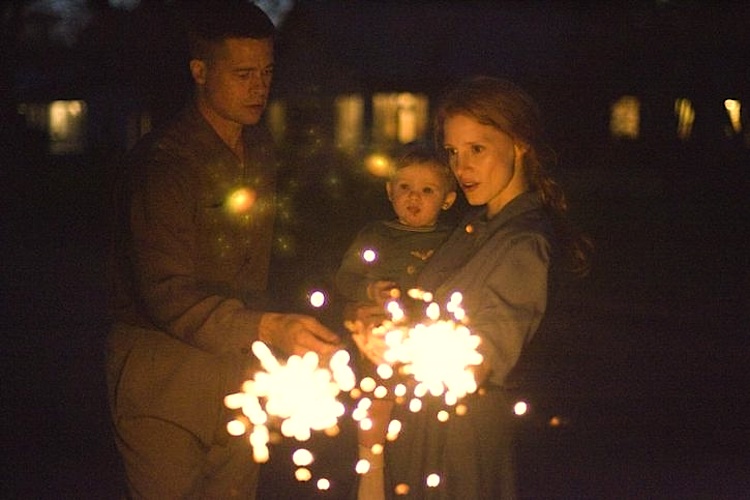
By Patricia Ducey. Terrence Malick’s latest, The Tree of Life, is a movie of big ideas: the cycle of birth and death, the mystery of suffering, and especially the necessity—and tragic elusiveness—of love. All Malick’s trademark film conventions are present here: the whispered voiceover narration, the elliptical narrative, the preoccupation with what is not said, what cannot be said but only imagined or felt. Malick’s genius has always been how he reveals the ineffable through the most mundane rudiments of everyday life in his characters. As Holly in Badlands seamlessly leaves her murdering boyfriend behind and begins a new life as wife and mother, we realize she is the innocent Malick imagines, never torn from any Eden. Or when Pocahontas at the finale of The New World rises, with a joyous smile of triumph, from her curtsy to the English King, we feel a kindred joy at her discovery of that new world – not as an “other” defined by conventional anti-colonial apologia, but as her own woman.
But in this film, Malick renders explicit, with unmatched visual and aural splendor, his vision of the essential spiritual quest; his characters literally ask God, where are you, why do you make me suffer? Tree of Life is almost an experimental movie, in that it eschews traditional narrative; no alarm bell plot points or expository dialogue here. So the passages of the family’s present life or memories seem more like montage than story; no one is explaining anything or planting clues. Any “real” story thus almost disappears. It is not surprising to read that Malick is an admirer of Kubrick—Tree of Life looks and feels a lot like Kubrick’s 2001: A Space Odyssey. Perhaps Malick at 67 feels ready to travel these same territories.

We first meet the main character, Jack, as a young boy in Texas in the late ‘50s. Jack’s mother (Jessica Chastain), loving and devout, narrates the opening of the film. She tells us that there are two paths in life, one of nature and one of grace, and that we must choose which one we follow. Nature cares only for itself, while grace relies on a sense of oneness with all of existence. News suddenly arrives that Jack’s younger brother has died at age 19. We are not told how or why, but we see how grief and spiritual panic devour the family—and these questions dog Jack for the rest of his days. He grows up resenting his harsh father (Brad Pitt), longing for the love his father cannot or will not give him. Years later, as a successful architect, Jack lives and works in skyscrapers amid a sterile concrete modernity. He is as cold to his own wife and his own father was to him; this coldness is mirrored in the towering glass cities and rippling freeways that stand in stark opposition to nature. The way of the mother or the way of the father? This is Jack’s lifelong insoluble dilemma.
Malick soon interrupts the story of the family and the death of the brother, and embarks on a depiction of his own genesis story, from a cosmic Big Bang to Earth’s volcanic beginnings, to the kill-or-be-killed era of the dinosaur—all with special effects engineered by renowned veteran Douglas Trumbull. When Jack’s story resumes, we see through Malick’s expert direction, and the amazing camera work of cinematographer Emmanuel Lubezki, a childhood of back yards and sprinklers, running boys and budding sexuality—and, finally, all the furious civilizing that parents, knowing the alternative, try to impose. No American director could have evinced the intensity and naturalness of these childhood scenes any better. Jessica Chastain as Jack’s mother and Brad Pitt as his father illuminate their roles – especially Pitt, who artfully subsumes his soft attractiveness into a more severe toughness befitting his man-of-action character. And ever one of our most skilled actors, Sean Penn excels as the spiritually bereft adult Jack.
As always, Malick captures his audience with a whisper, from the mother’s opening narration—prayer, really—to the otherworldly climax. But Tree of Life is not an easy film. It must be seen on the big screen; no other movie this cartoon summer will look or feel anything like it. The soundtrack of largely religious music reminds us that this is a spiritual cri de coeur from someone who feels the autumn chill. When the lights came up in our theater today, the silence lingered—no chit-chat or phones chirping open. And when I turned onto the freeway, I had to click my radio off. The wind rushing by, the hum of the engine pulling me along—it seemed more fitting to turn down the noise and listen, closely for once, as the world in its magnificence flew by.
Posted on May 28th, 2011 at 7:07pm.
Thank you for this poignant review.
Thank you!
This is one of the most beautiful films I’ve ever seen.
It truly is. Like I say, it has some faults, but I can’t stop thinking about it. How often can you say that about a film?
Great review.
I am anxiously anticipating this film. There simply aren’t enough projects like this getting made — I’m willing to give a chance to any film that bucks conventional narrative structure and relies heavily on moving images to tell a story.
I think Malick would rather have been operating in the silent era. He takes montage in a new direction, perhaps the direction film needs to go. We have kind of exhausted the tools of hardware and software in film.